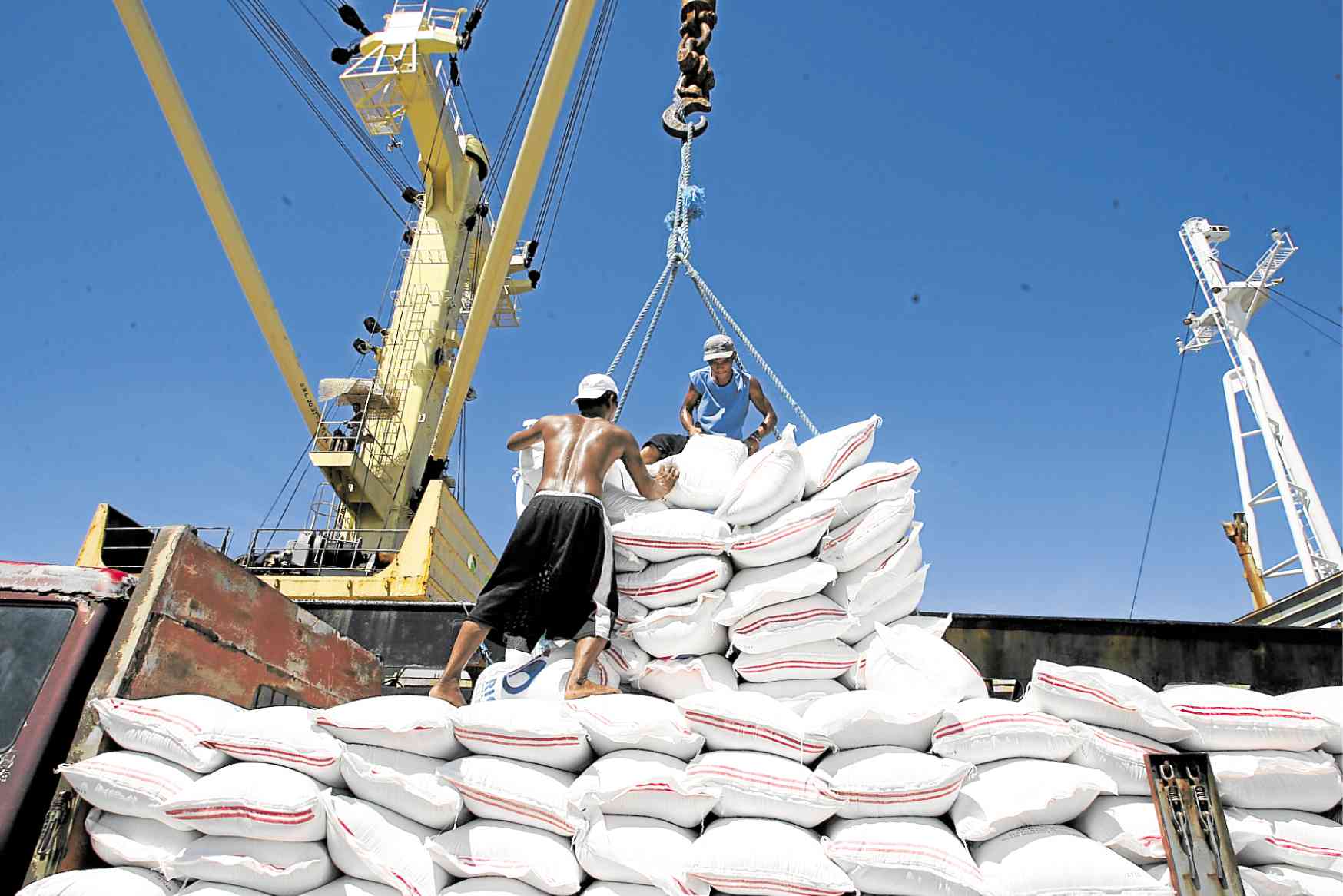Duterte may suspend rice importation

BIGGEST IMPORTER The Philippines has become the world’s top rice importer for 2019 with orders expected to reach 3 million metric tons by the end of the year, according to a US Department of Agriculture report. —INQUIRER FILE PHOTO
MANILA, Philippines — President Rodrigo Duterte has apologized to Filipino farmers and vowed to suspend rice imports amid falling palay prices that have caused them to lose billions of pesos as a result of the imposition of tariffs on imported grain in lieu of quotas.
But presidential spokesperson Salvador Panelo later clarified that no directive had been issued to suspend rice imports.
Cabinet Secretary Karlo Nograles on Monday said that suspending rice importation “is not as simple as that.”
In an interview with GMA News over the weekend, the President said he would direct the purchase of palay from local rice farmers.
“In the months of harvest, just buy it. Don’t import too much. Do not allow import, the government will not import. Put it on hold until the produce of local farmers is bought,” Mr. Duterte said.
Article continues after this advertisementHe said the government was willing to incur losses in buying palay from local farmers, who have been forced to sell their produce at a lower price.
Article continues after this advertisement“That is what government is for, to incur losses to help our farmers … That’s the only solution, to buy,” he said.
‘Just another joke’
He appealed to Agriculture Secretary William Dar and heads of other departments to help the farmers.
The Federation of Free Farmers (FFF) did not take Mr. Duterte’s statements at face value.
“We want to ask the President if this is just another joke or if this is the truth,” said FFF president Leonard Montemayor.
“We’ve been disappointed by so many false hopes that we cannot just take the President’s statements at face value.” he said.
Mr. Duterte made the remarks amid complaints about the effects of Republic Act No. 11203, or the rice tariffication law, which he signed in February.
The law lifted caps on rice imports to bring down prices of rice, following soaring prices of the staple in 2018. It allows individuals and businesses to import additional volumes of rice but requires them to pay tariffs to fund mass irrigation, warehousing and rice research projects to help farmers.
Sen. Cynthia Villar, chair of the Senate agriculture committee and one of the proponents of the measure, said the law would help farmers “improve their profitability and competitiveness.”
But the implementation of the law had the opposite effect as it led to plunging palay prices.
P62B in losses
The Philippine Rice Research Institute, an attached agency of the agriculture department, has placed at P61.8 billion the losses farmers have incurred so far due to the sharp drop in farm-gate prices of unhusked rice.
At P15.49 a kilo, the prevailing price of palay is the lowest in eight years, according to latest data from the Philippine Statistics Authority. In other provinces, rates are much lower at P11 a kilo.
The rice tariffication law reportedly led to the shutdown of 4,000 rice mills around the country and prompted 200,000 farmers to abandon their farms just five months after the law was passed.
Groups like Bantay Bigas and Kilusang Magbubukid ng Pilipinas have been calling for the law’s repeal as government interventions did not offset the huge losses incurred by farmers unable to compete with cheaper imported rice.
Biggest rice importer
With the law in place, the Philippines has become the top importer of rice for 2019 with orders of 2.99 million metric tons (MT).
The volume is expected to reach a record of 3 million MT by year-end despite a Philippine shortfall of just 1.9 million MT, according to a report of the US Department of Agriculture this month.
The President said he was not ready to repeal the rice tariffication law as he did not want another rice crisis on his hands.
Sought for comment, Panelo said: “As of this time, there is no order to stop rice importation given (to) Secretary Dar of the Department of Agriculture per the latter.”
In a phone interview, Nograles told reporters that economic managers and the DA would have to meet to respond to the President’s pronouncements.
“We will discuss that perhaps in the next Cabinet meeting,” he said.
In an interview aired over ABS-CBN’s “Failon Ngayon” on Saturday, the President said he was “conscious of the fact” that the rice tariffication law “will create a problem among our local rice growers.”
Higher rates
He said he could also order higher tariff rates for rice imports to discourage rice imports and balance the interests of Filipino farmers.
“But let me state, here and now, that my main concern is there must be rice at any given time,” Mr. Duterte said.
The FFF and the Samahang Industriya ng Agrikultura have called for the imposition of safeguard duties to temper the volume of rice imports, but economic managers rejected it for being “inflationary.”
“There is no need to repeal, revise, or suspend the rice tariffication law,” Finance Secretary Carlos Dominguez III said during the recent World Rice Congress.